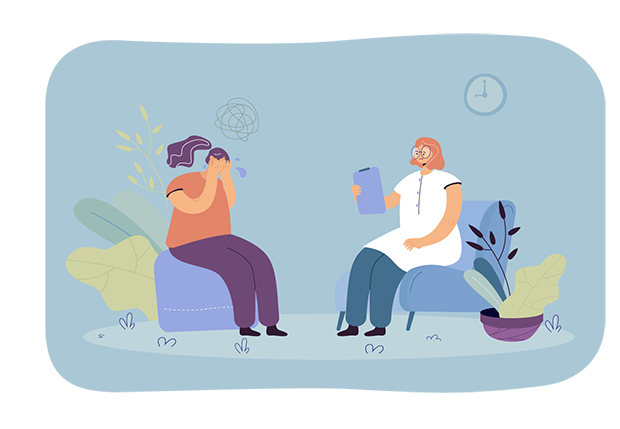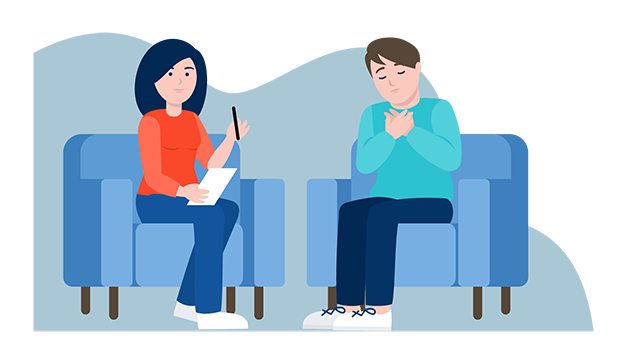Bulimia Treatment
in Atlanta
Bulimia is a common eating disorder that dramatically impacts a person’s physical and mental health. People who have bulimia often feel shame and are unsure about what kind of help they need. Atlanta Integrative Psychiatry provides a structured program for the treatment of bulimia that helps people understand the root causes of their illness. Our skilled staff teaches each person we treat to reframe their self-image and relationship with food so they can recover in full.


What is Bulimia Nervosa?
Bulimia nervosa is an eating disorder characterized by binge eating large amounts of food to the point of discomfort. The person typically feels shame about their behavior and attempts to rid themselves of the food through different types of purging. Purging behaviors include self-induced vomiting, and the use of diuretics, laxatives, and enemas. People with bulimia obsess over weight, clothing sizes, calories, and trying to lose weight. They often employ unhealthy diet methods without accepting that they put themselves in physical danger. When someone enters treatment for bulimia, they begin to explore the fact that eating disorders are complex mental health disorders that are rooted in an attempt to feel control. In fact, many people become bulimic to help numb themselves from past or ongoing issues. It is only through therapy that the individual learns healthy coping skills to replace their bulimic behaviors.
Signs of Bulimia Nervosa
When someone needs to seek professional treatment for bulimia, they will show signs that they have an eating disorder. Common signs of bulimia include:
- Binge eating large amounts of food
- Eating in secret
- Hiding food wrappers and dirty dishes
- Constantly on a diet
- Disappearing to the bathroom after meals
- Dental damage
- Gastrointestinal distress, including diarrhea, constipation, and abdominal pain
- Light-headed or dizziness
- Swollen salivary glands
- Low self-esteem
- Believing happiness correlates with losing weight and being a smaller size
- What Is The Difference Between Binge Eating and Bulimia?
- Long-Term Side Effects of Bulimia
- Psychological Effects of Bulimia
- How Is Bulimia Treated at Atlanta Integrative Psychiatry?
- How Long Does It Take to Recover from Bulimia?
While people with bulimia and binge eating disorder share similar emotions and behaviors, they are two different eating disorders. The main difference is that someone with bulimia uses purging methods like self-induced vomiting, and laxatives, diuretics, and enemas. Someone who binge eats but is not bulimic does not engage in compensatory behaviors. As a result, weight gain is more common with binge eaters.
All too often, people delay getting treatment for bulimia for years, which can result in tremendous physical damage. Common long-term side effects of bulimia include:
- Tooth decay
- Gum disease
- Damage to salivary glands
- Osteoporosis
- Osteopenia
- Damage to the esophagus
- Intestinal ulcers
- Irritable bowel syndrome
- Bowel obstruction and perforation
- Chronic acid reflux
- Kidney damage
- Irregular heartbeat
- Cardiac arrest
- Change in blood pressure
- Fertility difficulties
- Type 2 diabetes
While bulimia causes several types of medical problems, it can also lead to many psychological effects. It’s common for someone with bulimia to have poor self-esteem. Having bulimia often means feeling shame, embarrassment, and guilt. As well, bulimics have a poor body image that never really changes, despite cycling through the binge-purge behaviors in an attempt to achieve a weight they think will make them happy.
People with bulimia and other eating disorders often deal with a dual diagnosis. They not only have an eating disorder but also struggle with another mental health disorder, such as anxiety or depression. Because the person does not have any healthy outlets for their distressing feelings, they may have mood swings and act out in physical or emotional outbursts. They are also at risk of self-injury and suicidal feelings.
Our treatment for bulimia begins with an initial assessment to determine each person’s exact needs and goals. We typically treat people who have already completed a residential or other type of program. Atlanta Integrative Psychiatry accepts clients who are classified as medically stable and able to participate in their treatment with us.
Once we get to know a new client, we can determine which types of therapy will be the most effective and help meet their treatment goals. Psychotherapy offers effective methods to help people with bulimia take a fresh look at their negative thought patterns and reshape them. Our goal is to help each person develop a new relationship with their bodies, food, and their place in the world. We can also prescribe any needed medications to help with symptoms of co-occurring conditions like depression or anxiety. Finally, we provide nutrition counseling so people discover what their specific nutritional needs are and how to meet them.
How long it takes to recover from bulimia depends on a few factors. Treatment usually begins in a residential program where it’s most effective to stay for 60 days or longer. Once the person begins outpatient care, treatment can last for several months or a few years. This depends on how severe their eating disorder is and how long they’ve had it. As each individual continues to make progress in therapy, they will need fewer sessions. Treatment will conclude when they have reached the point where they have healthy coping skills in place and can avoid triggers for relapse without needing professional support.
Does Insurance Cover Treatment for Bulimia?
Most insurance companies cover some form of treatment for bulimia. Contact your insurance provider to find out what options you have for therapy, outpatient programs, and other types of treatment.

Begin Treatment for Bulimia in Atlanta, GA
Have you struggled with bulimia and need help learning to overcome it? Atlanta Integrative Psychiatry provides a highly effective program for the treatment for bulimia. Our skilled therapists use their experience treating people with eating disorders to help you understand how recovery works and what it looks like for you. We offer private, compassionate care in a comfortable setting.
If you would like to schedule an appointment with one of our therapists, contact us now. We can answer any questions you have and get you started on recovering from bulimia.
You are not alone. You deserve to get help.
Atlanta Integrative Psychiatry is an Industry leader in mental health treatment . Our team of top medical experts specialize in dual diagnosis treat and are committed to ensuring that each patient is treated as an individual.
Call us today, we're avialable 24/7.




